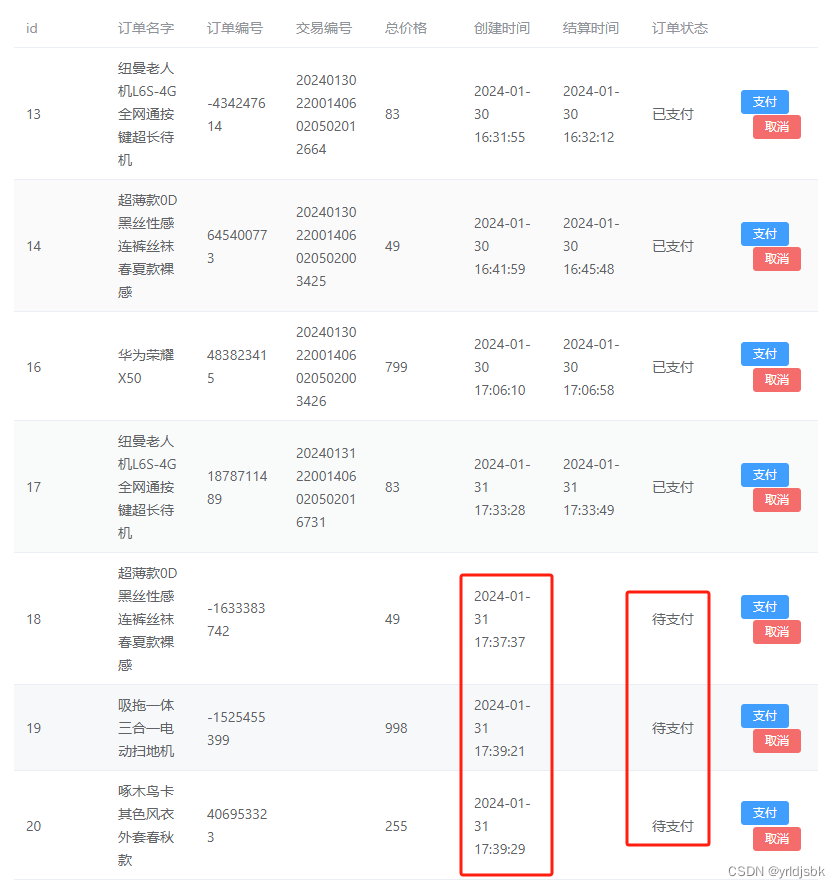本文介绍: 本文介绍了如何使用openpose在摄像头中进行检测,并保存到json文件。已给出完整代码。
编程如画,我是panda!
前言
之前给大家分享了如何搭建openpose环境,并进行了测试案例,但是如果要使用摄像头的话,还需要修改一下运行文件,并且这次会教大家如何输出到json文件 。
如果环境还没有搭建好,请参见我的博客:openpose环境搭建
一、了解输出格式
输出:
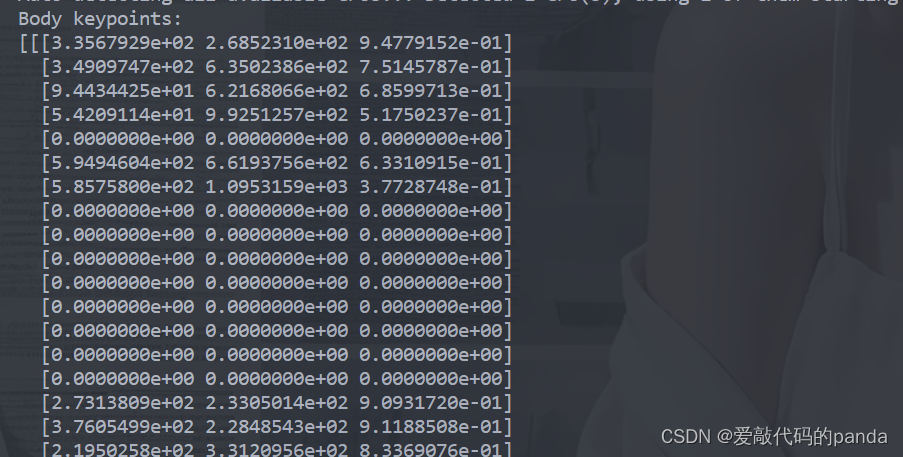

如果你使用一张图片进行测试,会得到一个n*25*3的矩阵, n代表检测到了几个人,25代表25个节点,3代表了(x坐标,y坐标,置信度)。
25个节点分别为:
// const std::map<unsigned int, std::string> POSE_BODY_25_BODY_PARTS {
// {0, "Nose"},
// {1, "Neck"},
// {2, "RShoulder"},
// {3, "RElbow"},
// {4, "RWrist"},
// {5, "LShoulder"},
// {6, "LElbow"},
// {7, "LWrist"},
// {8, "MidHip"},
// {9, "RHip"},
// {10, "RKnee"},
// {11, "RAnkle"},
// {12, "LHip"},
// {13, "LKnee"},
// {14, "LAnkle"},
// {15, "REye"},
// {16, "LEye"},
// {17, "REar"},
// {18, "LEar"},
// {19, "LBigToe"},
// {20, "LSmallToe"},
// {21, "LHeel"},
// {22, "RBigToe"},
// {23, "RSmallToe"},
// {24, "RHeel"},
// {25, "Background"}
// };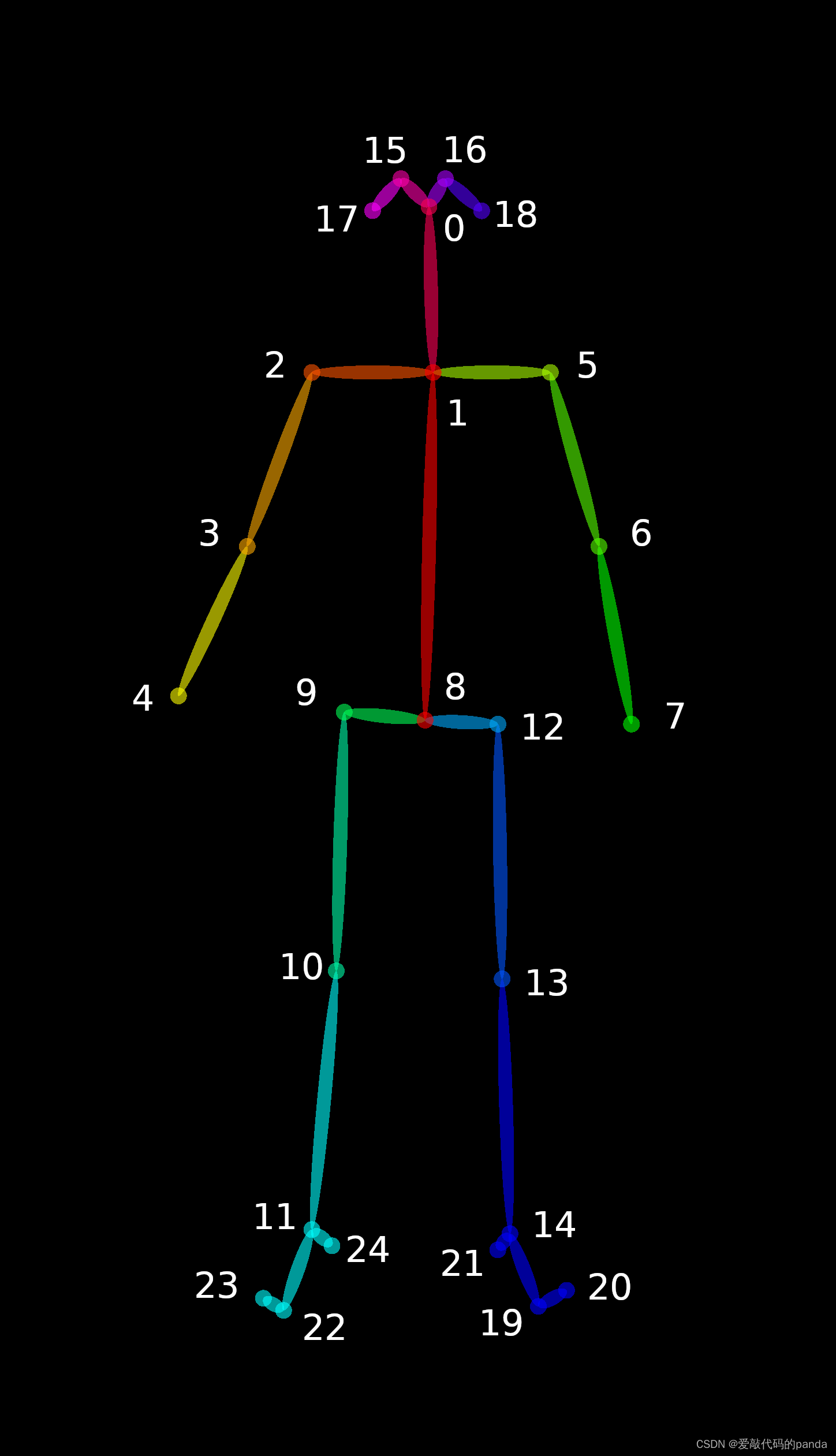
二、使用摄像头
openpose中有很多参数,可以使用参数来控制是否使用摄像头:
import os
import sys
import cv2
from sys import platform
import argparse
import numpy as np
dir_path = os.path.dirname(os.path.realpath(__file__))
sys.path.append(dir_path)
os.environ['PATH'] = os.environ['PATH'] + ';' + dir_path + '/bin;'
import pyopenpose as op
print(op)
print("成功引入pyopenpose")
parser = argparse.ArgumentParser()
parser.add_argument("--camera", default=0, help="Camera index for capturing video. Default is 0.")
args = parser.parse_known_args()
# Custom Params
params = dict()
params["model_folder"] = "models/"
params["net_resolution"] = "368x256"
# Starting OpenPose
opWrapper = op.WrapperPython()
opWrapper.configure(params)
opWrapper.start()
# Start capturing from the camera
cap = cv2.VideoCapture(int(args[0].camera))
while True:
# Read a frame from the camera
ret, frame = cap.read()
if not ret:
break
# Process the frame
datum = op.Datum()
datum.cvInputData = frame
opWrapper.emplaceAndPop(op.VectorDatum([datum]))
# Display the result
print("Body keypoints: n" + str(datum.poseKeypoints))
cv2.imshow("OpenPose 1.7.0 - Tutorial Python API", datum.cvOutputData)
# Break the loop when 'q' is pressed
if cv2.waitKey(1) & 0xFF == ord('q'):
break
# Release resources
cap.release()
cv2.destroyAllWindows()
opWrapper.stop()
如果你想输出到json文件,可以设置参数:
params["write_json"] = "json_output/" # 指定保存 JSON 文件的目录完整代码如下:
import os
import sys
import cv2
from sys import platform
import argparse
import json # 添加 json 模块
dir_path = os.path.dirname(os.path.realpath(__file__))
sys.path.append(dir_path)
os.environ['PATH'] = os.environ['PATH'] + ';' + dir_path + '/bin;'
import pyopenpose as op
print(op)
print("成功引入pyopenpose")
parser = argparse.ArgumentParser()
parser.add_argument("--camera", default=0, help="Camera index for capturing video. Default is 0.")
args = parser.parse_known_args()
# Custom Params
params = dict()
params["model_folder"] = "models/"
params["net_resolution"] = "368x256"
params["write_json"] = "json_output/" # 指定保存 JSON 文件的目录
# Starting OpenPose
opWrapper = op.WrapperPython()
opWrapper.configure(params)
opWrapper.start()
# Start capturing from the camera
cap = cv2.VideoCapture(int(args[0].camera))
while True:
# Read a frame from the camera
ret, frame = cap.read()
if not ret:
break
# Process the frame
datum = op.Datum()
datum.cvInputData = frame
opWrapper.emplaceAndPop(op.VectorDatum([datum]))
# Display the result
print("Body keypoints: n" + str(datum.poseKeypoints))
# Check if JSON file exists and read keypoints from JSON
json_path = os.path.join(params["write_json"], f"{str(args[0].camera)}.json")
if os.path.exists(json_path):
with open(json_path, 'r') as json_file:
json_data = json.load(json_file)
keypoints = json_data["people"][0]["pose_keypoints_2d"]
print("Body keypoints from JSON: n", keypoints)
cv2.imshow("OpenPose 1.7.0 - Tutorial Python API", datum.cvOutputData)
# Break the loop when 'q' is pressed
if cv2.waitKey(1) & 0xFF == ord('q'):
break
# Release resources
cap.release()
cv2.destroyAllWindows()
opWrapper.stop()
结果:(要把摄像头打开哈,我就不打开了(●’◡’●))
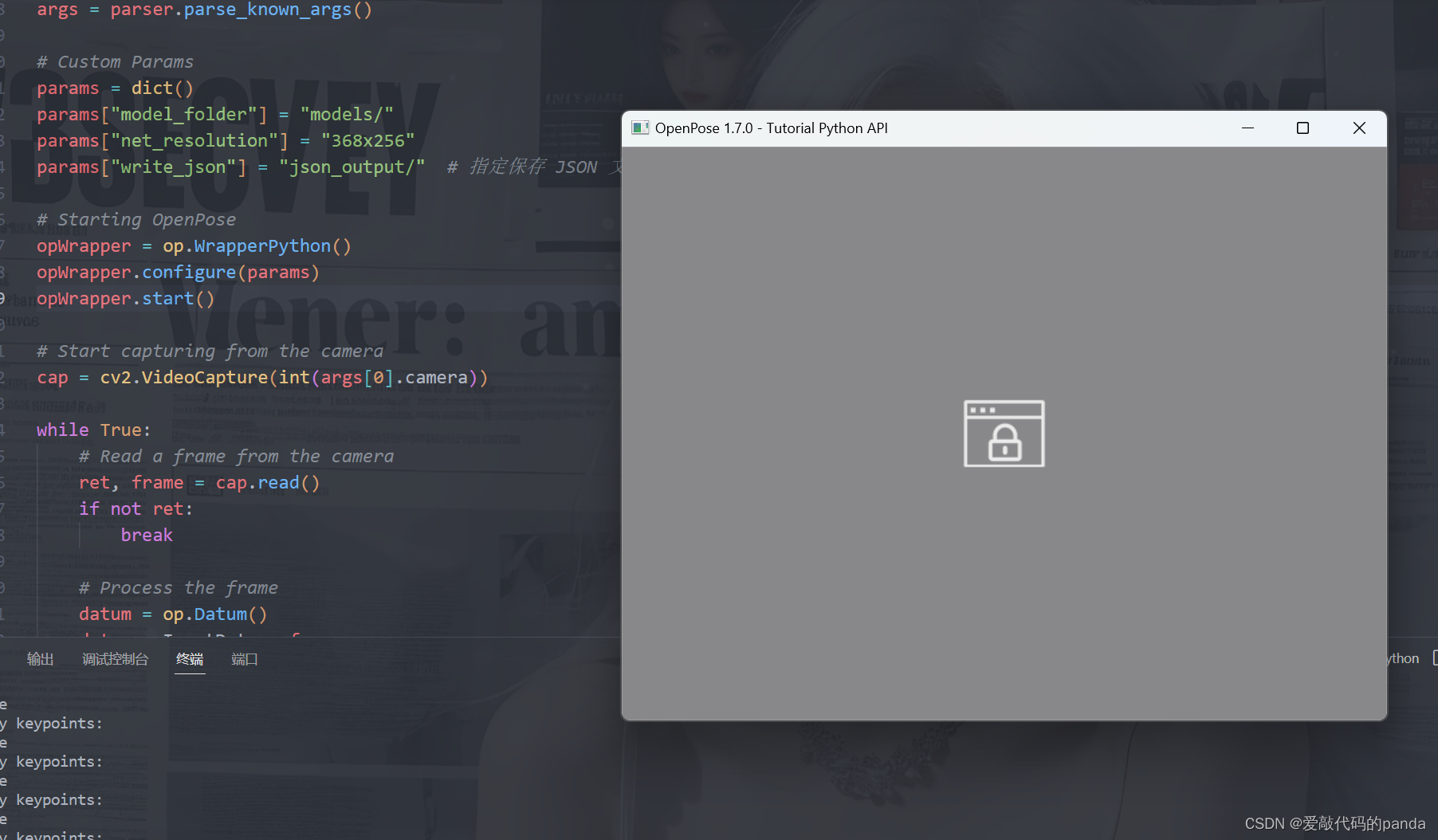
然后会得到json文件夹:
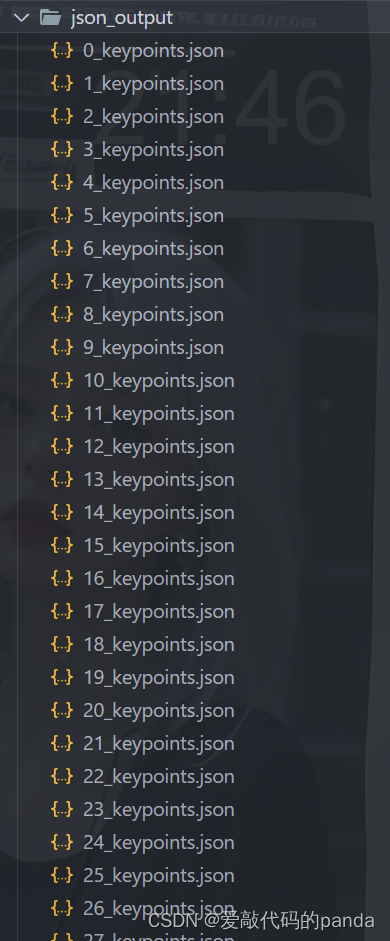
原文地址:https://blog.csdn.net/m0_62627216/article/details/135682384
本文来自互联网用户投稿,该文观点仅代表作者本人,不代表本站立场。本站仅提供信息存储空间服务,不拥有所有权,不承担相关法律责任。
如若转载,请注明出处:http://www.7code.cn/show_58098.html
如若内容造成侵权/违法违规/事实不符,请联系代码007邮箱:suwngjj01@126.com进行投诉反馈,一经查实,立即删除!
声明:本站所有文章,如无特殊说明或标注,均为本站原创发布。任何个人或组织,在未征得本站同意时,禁止复制、盗用、采集、发布本站内容到任何网站、书籍等各类媒体平台。如若本站内容侵犯了原著者的合法权益,可联系我们进行处理。



